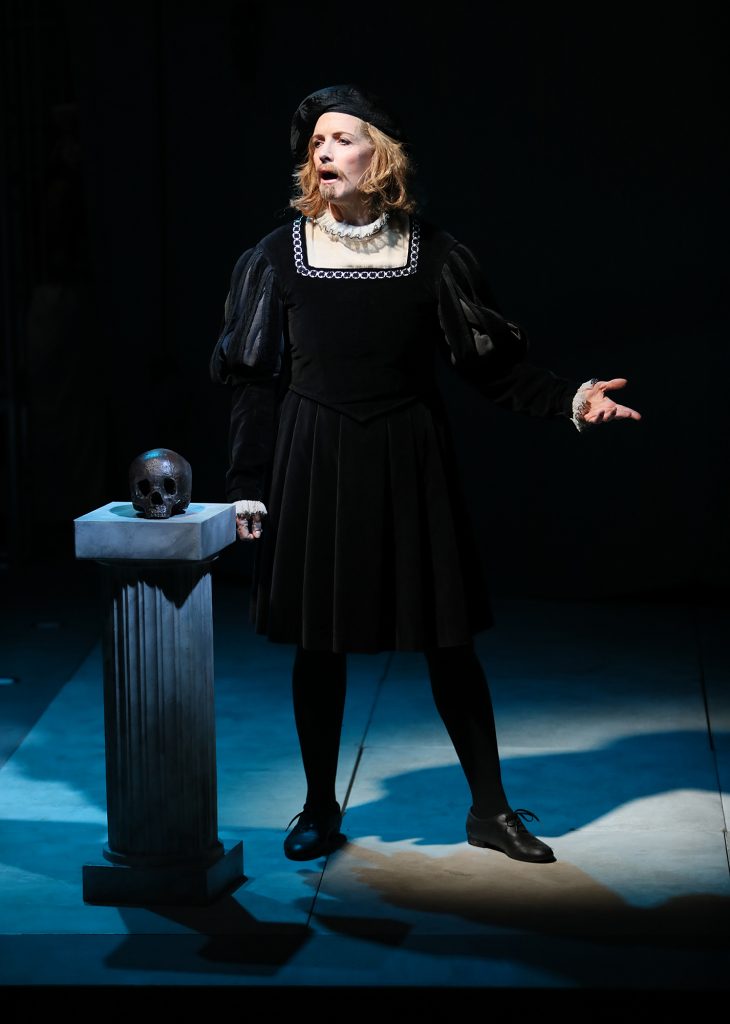
Credit: David Cooper
At Bard on the Beach until September 13, 2018
Tickets from $24 at bardonthebeach.org or 604-739-0559
Posted July 15, 2018
You can take actor/director Lois Anderson out of the much-loved, sorely missed Leaky Heaven Circus but you can’t take Leaky Heaven out of Lois Anderson. That ragtag Circus was famous for jamming as much stuff into its pre-Christmas show as it could: everything but the kitchen sink and I think one year there may even have been a kitchen sink. The shows were fun and riotous and the costumes came from cutlery drawers, attics and Value Village. And there was a dog.
There’s no dog in this Bard production directed by Anderson but there’s a lot of stuff and not a whole lot of Aristophanes who wrote the original back in 411 BC. The program notes lay out Aristophanes’ plot but don’t expect a lot of it to show up.
Freely – and I do mean freely – adapted by Anderson and Jennifer Wise, the framework is this: a small amateur theatre company is about to present Hamlet when one of the all-women company asks why they are doing a play about a guy who can’t make up his mind when they could be doing a play about women stopping the everlasting war between the Athenians and the Spartans by withholding sex from their partners. As keen on sex as their husbands, the characters in the play very reluctantly agree with anti-war protester Lysistrata. And just as reluctantly do the women of the present-day little company foresake Hamlet and agree.

Credit: Tim Matheson
One of the cleverest parts of this production is mustached Colleen Wheeler, as Hamlet who keeps coming on stage in Elizabethan black velvet carrying “poor Yorick’s” skull and attempting to do the play about the melancholy Dane.
Thrown into this particular stew are First Nations issues, a protest against proposed destruction of Vanier Park for a new shipping port, rape of the planet and, of course, gender issues (“If only you men had brains instead of tools.”) There’s so much in here – some of which, but not all of which, is funny – that you hardly know where the focus is.
At the end of Act 1, a tantalizing tidbit is thrown out to those of us looking for meat: is ‘doing theatre’ ever going to change anything or lead to action? Is civil disobedience more useful? In effect, do the arts, in general, really matter? Or is it just another way of amusing ourselves to death? Obviously, I believe the arts are important but do they initiate change?
Act 2 turns into Lysistrata: The Musical; no songs in Act 1 but a handful – with lovely harmonies – in the second act. That appears strange; why not in both acts.?
Barbara Clayden’s costumes throughout are fantastic. Since the switch from Hamlet to Lysistrata was a last-minute idea, the characters are outfitted in whatever they could find in their houses. Helmets topped with the business end of brooms; headdresses made of a pyramid of gold-sprayed empty toilet paper rolls or a mound of empty plastic water bottles. Wigs are old mops. Armour comes from the kitchen tool drawer. And red (for the Spartan men) and blue (Athenian men) pool ‘noodles’ are permanently erect, strap-on phalluses. I know, I know, the Greek comedians used strap-ons, too; but it does go on and on.

Credit: Tim Matheson
The battle between the old men and old women also is, uh, extended: long, dangling dugs hang from the women’s chests and droopy testes swing from the men’s groins. In the ensuing battle the withered, floppy boobs are swung like cudgels. Fun for a while but not that long.
Quelemia Sparrow brings forward the First Nations point of view, opening the play with the usual advisory about the production taking place on the Musqueam, Squamish and Tsleil-waututh hereditary land. She follows that up with a friendly, “Make yourself at home.” Giggle. “Oh, I guess you already have.” She closes the play with the planting of a root used in the past by First Nations women. It’s affecting but sends the focus spiralling off again.
Adele Noronha, the most radical of the little theatre company of women, is tough and mouthy especially in her interaction with the two cops who turn up to arrest her for defacing public property.
Terrifically funny is Sebastien Archibald as the police officer trying to make an arrest. The character is so thick, so unenlightened that when he’s moved to tears, you feel like standing up and cheering for him.

Credit: Tim Matheson
In spite of all the rowdy silliness, Luisa Jojic amazingly stands her ground and is a convincing, even dignified Lysistrata. It would be really interesting to see her do the play straight up. She could definitely do it.
Big standing ‘O’ at curtain left me thinking I’m just a grumpy old broad. After all, even Aristophanes’ Lysistrata was a comedy and a very ribald one at that. There’s no doubt Anderson has come up with a fresh take on Lysistrata; it’s innovative and clever but I left Bard on the Beach wanting to see the real deal.

